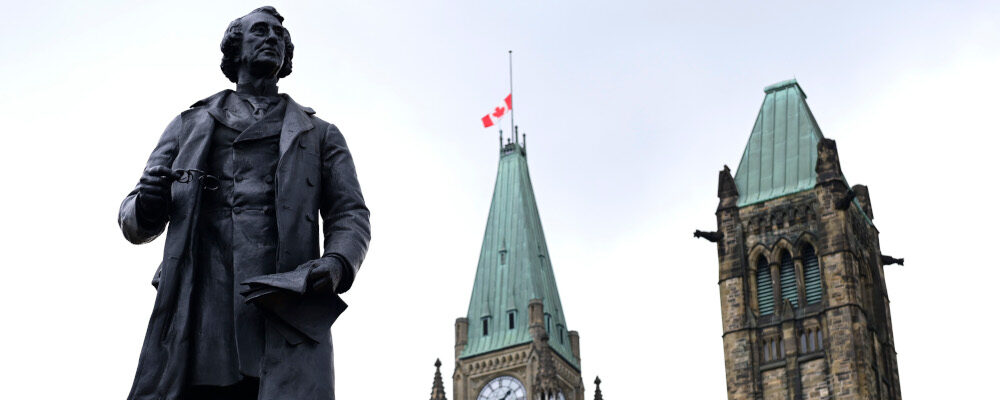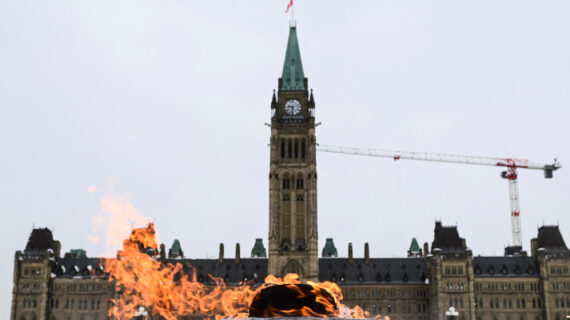I never thought that I, as a Canadian and a former candidate for Parliament, would feel compelled to stand up and defend Sir John A. Macdonald—our first prime minister and one of our greatest political leaders. Such are the times.
There’s a high school named after Sir John A. Macdonald in the neighbourhood where I grew up and that I sought to represent in Parliament. Over the decades it has played an important role in the Scarborough community and has educated tens of thousands of Canadians. Teenagers should be happy to attend a school so named. It’s named for a leader of whom we should be proud of and who bequeathed to us a nation to be proud of.
Yet the Toronto school board is considering the renaming of that school as other governments have erased Sir John A. Macdonald from our public spaces because of his role in residential schools in the 1800s. Recently, the National Capital Commission announced plans to change the name of the Macdonald Parkway in Ottawa. This movement to erase Macdonald is an unfortunate and destructive development for our country.
It’s long past time for our leaders to take a courageous stand against this immature nonsense and defend our founder. What exactly are they afraid of?
The issue is not about turning away from the injustice of Canada’s residential schools, and we must meet the pressing need to improve the quality of life of Indigenous Canadians. All must be fully committed to that goal. This is about an altogether different subject—the rightful place in Canadian history of Sir John A. Macdonald.
Enlightenment against the Four Horsemen
Historical events are never fully just or fully humane because events are made by humans, and humans are never fully just or fully humane. Man’s brutality to man and the countervailing march of progress mark the major streams in world history. For thousands of years, the two conflicting forces of humanity have been the forward pull of peace, wealth, enlightenment, and science straining against the backward drag of violence, poverty, ignorance, and disease. Pick up any history book, turn to any page, and you’ll be reading about a small battle in the larger war between light and darkness. One can argue that the former only started to prevail in the second half of the twentieth century, well within our living memory.
The founding of countries was nasty business
Almost all countries have been established by similar methods. A geographic area must be defined, acquired, and protected, which means war. Other cultures in that territory must be eliminated, separated, or dominated, which means genocide. Then a national founding myth, skewed to the heroic, must be created to unify the culture and provide social cohesion. This requires the editing of the truth to avoid just how unpleasant that business actually was.
Canada’s founding followed the same path, but by any measure it was far more peaceful and balanced than any peer country. Most countries are based on race or language. Very few share our core characteristics—a transcontinental settler society whose membership is granted not based on race, creed, or language, but on common values, forward-looking ideals, and a shared commitment to a shared future. We owe much of this to the wisdom and peaceful ways of the Fathers of Confederation led by Sir John A. Macdonald.
Sir John A. and the leaders of that era did their best in the world of the late 1800s as it then existed with all of its limits, knowledge, and strictures. As the saying goes, the past is a foreign country; they do things differently there. They were men of their times, limited by the contemporary confines of class, religion, mores, science, and politics. Yet they still pressed forward and pushed those limits. Despite being men of their time, they were very much ahead of it. They should be judged on the entirety of their achievements.
It wasn’t just him
It is human nature to yearn for a single cause of a problem, for one man to blame, and to look for a single salutary act to wipe it all clean. It may satisfy our desire for a simple explanation, a singular cause of a complex problem that still bedevils us today but it wrongfully acquits so many others of the charge.
All leaders bequeath good and bad legacies to their heirs. The mistreatment of Indigenous Canadians will always stain our history books, yet we must not pin the accumulated failures of all governments across 150 years on Macdonald. Not only would it be historically inaccurate but it lazily excuses the many others who were equally culpable if not more so.
Who deserves our shame? The ones who established the residential schools or the ones who kept them going after the harm so obviously manifested itself across the decades? The erasure of Canada’s founder is not only the wrongful conviction of Sir John A. Macdonald but it’s also the wrongful acquittal of his many successors.

Bereft of heroes. Devoid of pride.
Wilfred Laurier, D’Arcy McGee, Joseph Brant, Brébeuf, Stephen Leacock, Sam Steele, Agnes Macphail, Norman Bethune, Oliver Mowat, Frederick Banting, Grey Owl, Henry Kelsey, William Osler, Winston Churchill, and Pope John Paul II all have schools in Toronto named after them. All great but imperfect. Must they too be erased? And who’s next?
Erasing Sir John A. Macdonald’s name from our public space is nothing more than tokenism and childishness, with barely a passing glance at history, that will have no meaningful impact on the very people it professes to help. It only alienates the broad swath of Canadians whose support is needed to drive at real change. And the application of an increasingly strict, unforgiving purity test applied retroactively to great Canadians who lived and died long ago in a different world will inescapably lead to a nation bereft of heroes, devoid of pride, with no spirit or unifying beliefs, and filled with anger and resentment fueled by historical grievances.
We’re a great country. The world is getting better.
Canada is a blessed country to which many millions of immigrants came for a better life. From before our official founding, they braved perilous journeys, financial hardship, great distances from family and familiarity, and sailed and flew into an unknown future because of their faith in Canada. They placed their future and their children at the mercy of Canada. Why Canada?
Contrary to what some pessimists argue, Canada was and continues to be more peaceful, more just, and more enlightened than any other country. We owe much of this collective achievement to our political culture—the Canadian political culture—and our political culture is very much the legacy of Sir John A. Macdonald. Tolerance, generosity, the peaceful and pragmatic bridging of political differences, the spirit of compromise, measured responses to problems, and the never-ending journey to a better Canada for all. These were his politics and the values that he championed.
Canadians are proud of their history and rightfully so. The life of Canada led by the decisions of its leaders, like our own lives and those of our forebears, remains imperfect, for a national life is solely composed of human acts; but humans can never be perfect, free from error that only time and hindsight reveal.
Different opinions are not unpatriotic or invalid. New knowledge emerges through historical study. New perspectives are shared. There’s nothing wrong with offering a fuller picture of our historical figures. We live in a free country where reasoned disagreement should be noble and is the mark of a mature society.
The world is moving to a better place—the rule of law, respect for the dignity of all humans, the advancement of science, and the conquest of disease. No one would prefer that their children were born in 1923 over 2023. Yet problems and failures persist.
Vandalizing monuments is easy. Pulling down names is easy. Improving lives is hard. Changing the future is hard. Sir John A. Macdonald knew this. He dedicated his life to the hard work of building Canada. Honouring him is right.




